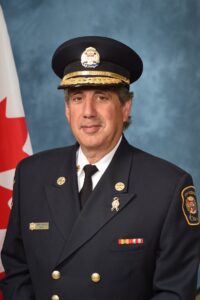Ottawa First Responders Foundation reduces barriers to pathways of support

Meet Gerry Pingatore, 42 years of service as a Firefighter and as a leader in the Ottawa Fire Service, Pingatore served on the Fire Management Team and as Fire Chief, where he managed a team of 1500 Firefighters and support staff.
“As Fire Chief, you get a different perspective and you become deeply invested in the overall wellbeing of your members.” Pingitore donates his time and experience as a member of the Ottawa First Responders Foundation Board of Directors, helping “fill the gaps” in services available to First Responders, especially relating to mental well-being.
“Ottawa First Responders Foundation is a dream come to fruition,” says Pingatore.
“Mental health training primarily started from a prevention perspective. Dealing with mental illness during calls, we needed information about how to interact in the most helpful ways,” says Pingatore, “The Fire Department had some forward thinking Firefighters who attended seminars and training on their own then came back and educated us. Looking back, it was clear that challenges were there that weren’t taken seriously. Thinking someone is just a “hard-partier” rather than seeing it as a possible symptom of dysregulation. We would joke about it. We didn’t know. Hindsight.”
Pingitore realized these insights were not only applicable to the people they served, but for the First Responders themselves. Pingitore knew that flexible and accessible resources for all tri-service members was needed from observing the evolution of science and discourse on trauma or mental wellbeing.
“Each service has different entitlements and coverage, and union agreements, so there is no single system to navigate. We encourage folks to go through their employer first and then we can augment what they have been able to arrange,” explains Pingitore, “The Employee Assistance Program (EAP) was available to Firefighters but the EAP roster was not prepared with skilled clinicians who could handle First Responders’ and/or their spouses’ needs. Benefits vary greatly across services and all packages are limited for mental health. If a First Responder spends 2 of 6 sessions explaining their context it is unhelpful.”
“This brought about the question: How does OFRF get First Responders help in a timely manner? The longer it takes to treat trauma the harder it can be.”
People have confided in Pingitore that they think they need help and don’t want to use EAP. And even if they did, it is a 6-month wait for an appointment. “During a mental health service shortage and a global pandemic we needed commitment to timely clinician access for trauma. In response, the OFRF created a list of available clinicians who are committed to availability within two weeks for First Responders to feel comfortable reviewing anonymously. In order to be on the roster, they need trauma expertise and to keep spaces available for urgent appointments.”
Reducing barriers to pathways that can support First Responders is fundamental to success. Peer support, educational programs, and a growing list of treatment providers are now in place. The current services were OFRF’s most urgent and achievable goals, and the OFRF will work to expand them in order to meet the needs in Ottawa.
“First Responder mental wellness can have a very high cost on the family. I don’t want the funds to be a barrier to support. OFRF pays clinicians for support. The nature of trauma needs responsiveness – a drop-in, speak live to someone, get crisis support.” Pingitore envisions a space like AA – a casual supportive space. He says folks want something familiar. “We understand each other. First Responders have a different reality, like obsessing over preventable deaths after seeing so many.”
“I am so lucky. My wife and my children are and have always been very supportive. I was overly cautious from my work. After so many years, every 2 kilometres of this city I see calls I have been on, good news stories and bad news stories. For instance I would be on a call with a child fatality, heading home and hugging my daughter of the same age, it was really, really hard.”
“Shift arrangements have changed so the people you are on hard calls with aren’t the same people next time you work. Back in the day we would have our peers who were there to debrief with. If you don’t have support at home and go in on the next shift with no one to talk to then you are left to process that experience on your own.”
All First Responders can experience trauma or mental health crisis, it is the nature of the job. Pingitore uses his experience to identify areas where the Ottawa First Responders Foundation can support the City of Ottawa’s existing support. His experience also informs policy advocacy. For example: Legislation to cover First Responders requires them to have a PTSD diagnosis, which is a huge barrier because it is viewed as permanent and requires removal from work. People who fear stigma (justifiably) will not use these pathways. No one wants to file a Workplace Safety and Insurance Board (WSIB) claim.
“Getting support should not be a punishing experience. Trauma is part of the job. It is complex to navigate support services available or entitlements and they are definitely not equal. There are many collective agreements to navigate benefits and entitlements. Veterans and retirees have little to no benefits and the lingering effects of years of service can often create issues to address later in life,” explains Pingitore. “Volunteers often support people they know in their community and it has an impact. Here I am, retired with little benefits and I can’t imagine needing to hide injuries from work or have the burden of expensive therapies. We are learning so much about the nature of trauma through medicine and science. Equitable and available support through the Ottawa First Responders Foundation can help provide access to education and mental health programs for all First Responders.”



